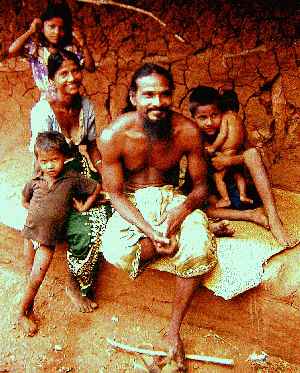
|
||||
Wanniyal-aeto Human Rights
In the absence of any provision for direct representation of indigenous interests in official decision-making, the Wanniyalaeto have explored other potential avenues to achieve justice, including a court system that is completely alien to their own tradition of justice. Going still further, chief Tissagami and other Wanniyalaeto leaders have been granted sympathetic hearings by Presidents Jayewardena and Premadasa respectively and by other high-ranking officials who have promised to rectify injustices, but resistance to change within the government bureaucracy has effectively stifled every high-level initiative designed to respect Wanniyalaeto aspirations. Over the years, scientific interest in the millennia-old Wanniya-laeto culture has helped to bring their plight to international notice. In particular, one Swedish cultural anthropologist, Dr. Wiveca Stegeborn, has been closely associated with the Wanniyalaeto community of Dambana since 1977, even to the extent of learning their language and living among them as one of their people. With her professional training and close familiarity with the kinds of problems that the Wanniyalaeto have faced in recent years, Dr. Stegeborn has played an invaluable, if little-appreciated, role in garnering international sympathy and support for the Wanniyalaeto community. With Dr. Stegeborn serving as their intermediary and patron, the Wanniyalaeto were invited to come to Geneva in 1985 to submit testimony before the United Nations Working Group on Indigenous Populations Commission on Human Rights, Sub-Commission on Prevention of Discrimination and Protection of Minorities. But the three Wanniyalaeto delegates were unable to attend because officials of the Sri Lanka Government's Department of Immigration and Emigration refused to issue passports to them. One of the reasons offered for the refusal of passports was that the Wanniyalaeto were "not real Sri Lankans".8 Subsequently, Dr. Stegeborn was declared persona non grata, further obstructing efforts to redress social injustice. Wanniyalaeto people say that they are still prohibited from pursuing their ancestral livelihood and face harassment or arrest by wildlife officials if they are caught 'trespassing' outside of their tiny enclaves. Tribal leaders accuse the armed forest officers of intimidation and allege that only recently the same officers were responsible for the shooting deaths of three Wanniyalaeto clansmen.9 To date, however, no investigation of the incident has been made. |
| Living Heritage Trust ©2024 All Rights Reserved |
